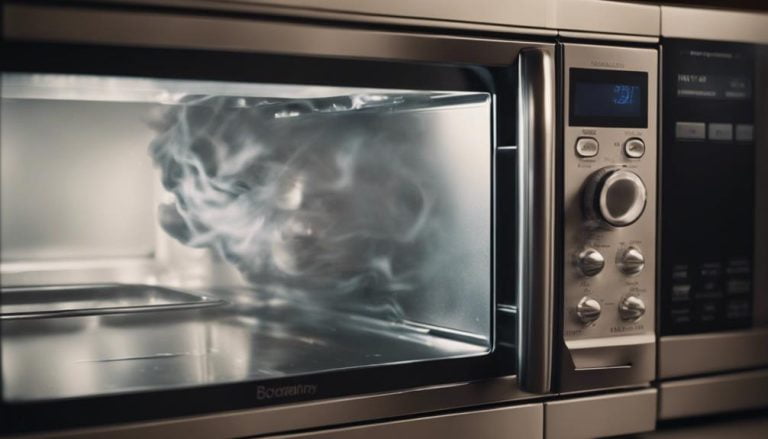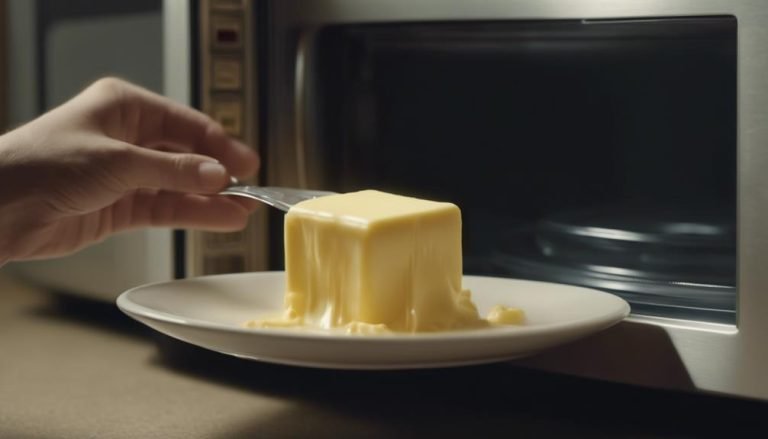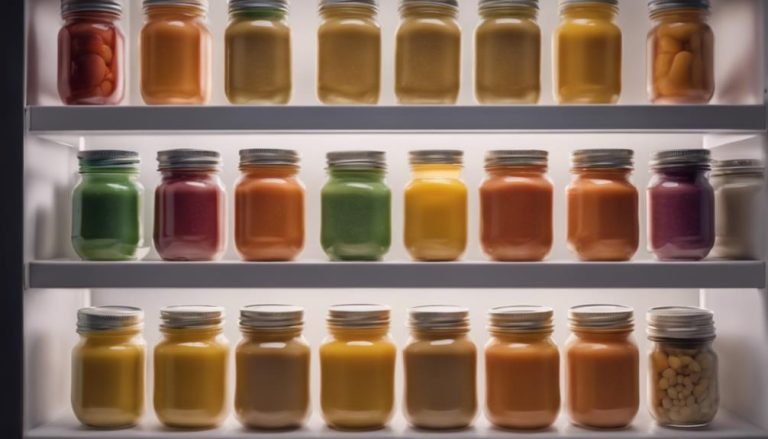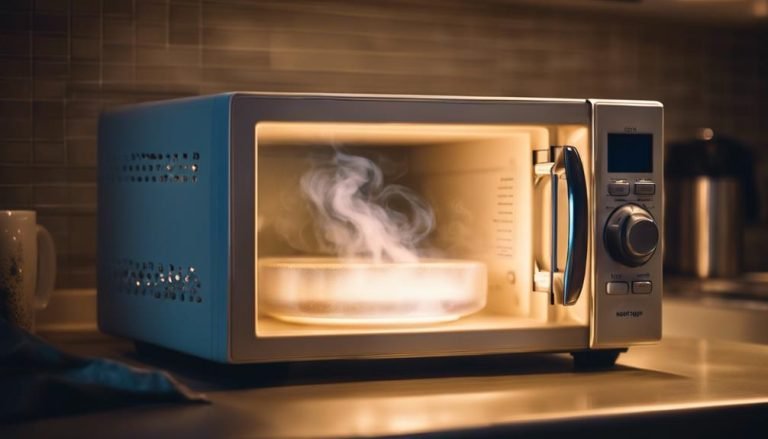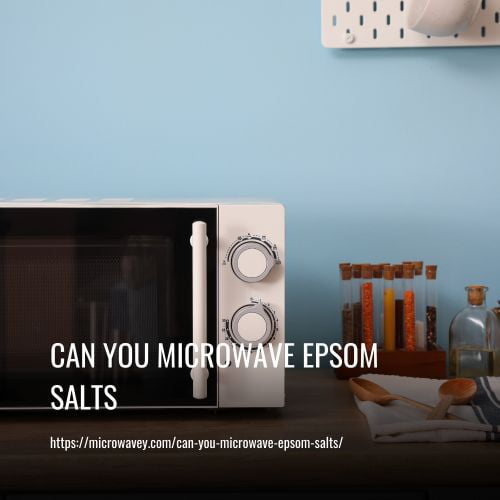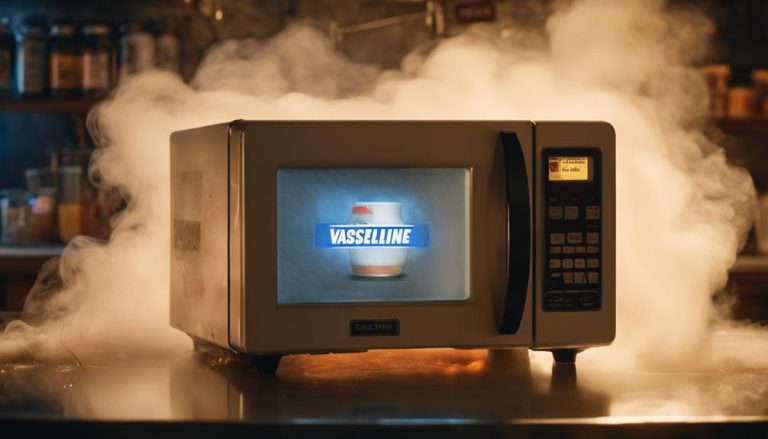Can You Microwave a Mason Jar
Yes, it is generally safe to microwave a Mason jar as long as it is made of microwave-safe glass and does not have any metal parts. However, it is important to exercise caution and follow some guidelines to avoid potential risks.
Always check if the Mason jar is labeled as microwave-safe before using it in the microwave. Additionally, make sure the jar is clean, without any cracks or damages, as these could cause it to shatter in the microwave.
It is also recommended to remove any metal lids or bands before microwaving, as they can cause sparks or damage the microwave. Lastly, be mindful of overheating the jar, as it can become extremely hot and cause burns.
Overall, using a microwave-safe Mason jar can be a convenient and safe option for heating or cooking food.
Key Takeaways
- Check for 'microwave safe' label on Mason jars to avoid shattering
- Remove metal lids before microwaving to prevent accidents
- Use protection when handling hot jars to prevent burns
- Choose glass or ceramic containers labeled as microwave-safe for heating
Safety of Microwaving Mason Jars
When considering the safety of microwaving Mason jars, it is crucial to heed the presence of a 'microwave safe' label on newer jars, which signifies their compatibility with microwave usage.
Glass jars not labeled as microwave safe can become very hot and risk shattering when exposed to high temperatures. Boiling water and extreme heat can stress the glass, leading to potential breakage. Thicker glass Mason jars are more likely to be microwave safe compared to thin ones, which are at a higher risk of breaking.
To ensure safety, always follow the guidelines provided by the manufacturer and avoid microwaving Mason jars that do not have a designated 'microwave safe' label.
Precautions to Take
Before microwaving a Mason jar, it is crucial to take necessary precautions to ensure safety. This includes checking for a 'microwave safe' label on the jar, avoiding metal rings, and handling hot jars with care.
Following these safety tips and proper jar handling practices can help prevent accidents and potential hazards associated with microwaving Mason jars.
Safety Tips for Microwaving
Prior to microwaving a Mason jar, it is essential to ensure that it bears a microwave-safe symbol on its bottom to prevent potential hazards. When it comes to microwaving glass containers like Mason jars, safety should always be the top priority. Here are some safety tips to keep in mind:
- Look for a microwave-safe symbol on the bottom of the Mason jar.
- Avoid microwaving Mason jars without a safety label to prevent the risk of shattering.
- Never heat Mason jar metal rings in the microwave as they can cause sparks.
- Be cautious of handling hot Mason jars due to heat retention after microwaving.
- Use Mason jars for quick-heat items like pre-cooked pasta and soup to minimize microwave exposure.
Proper Jar Handling
To ensure safe handling of Mason jars when microwaving, it is crucial to be mindful of their high heat retention properties. When heating Mason jars in the microwave, they can become extremely hot, especially when containing hot water or other liquids. Always use caution when removing them from the microwave to avoid burns or accidents.
Remember that glass containers, including Mason jars, can retain heat for a long time, so it is advisable to use proper protection such as oven mitts or towels. Additionally, avoid sudden temperature changes, like placing hot Mason jars on a cold surface, as this can cause the glass to crack.
Alternatives for Heating
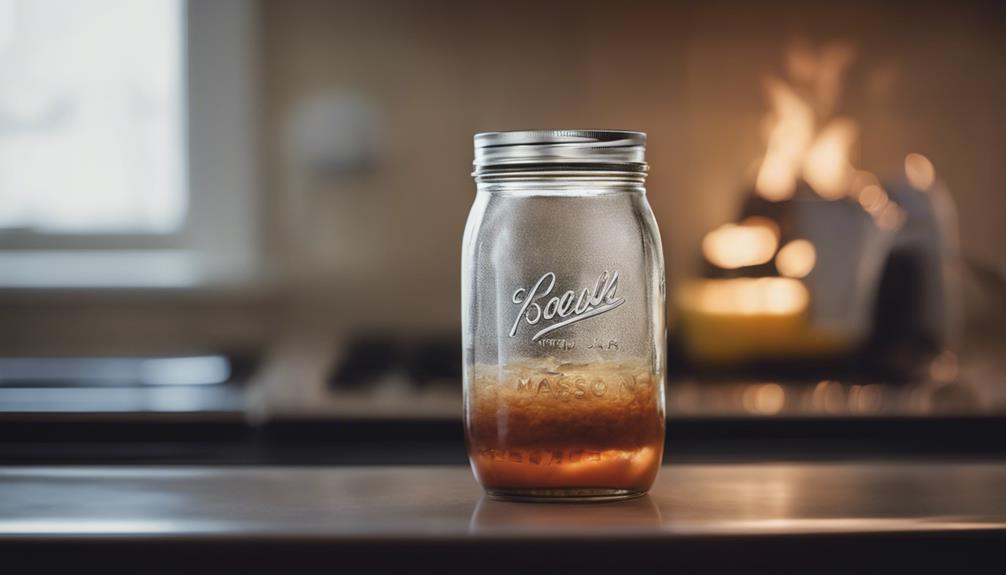
When considering alternatives for heating food in the microwave, it is essential to prioritize safety and efficiency.
Safe heating methods involve using containers specifically labeled as microwave-safe to prevent accidents.
Exploring various microwave-safe containers can help avoid potential risks associated with using non-tempered glass mason jars for items requiring longer or higher heat exposure.
Safe Heating Methods
When considering safe heating methods for food items in glass jars, it is essential to prioritize microwave-safe containers for optimal food preparation. When dealing with Mason jars, it is important to follow these guidelines:
- Check for a 'microwave safe' label on the bottom of the jar.
- Test thicker glass jars in the microwave for a minute or two to assess compatibility.
- Avoid microwaving thin Mason jars as they may shatter.
- Refrain from using Mason jars without a safety label to prevent hazards.
- Quick-heat items like pre-cooked pasta and soup are suitable for heating in Mason jars in the microwave.
Microwave-Safe Containers
For safe heating in the microwave, utilizing microwave-safe containers such as ceramic, glass, or designated microwave-safe plastics is crucial to prevent potential hazards.
When heating items like hot water or food storage in the microwave, it's important to avoid using containers like mason jars that are not labeled as microwave-safe. Choosing the right container can prevent risks such as shattering and ensure the safe heating of your food or beverages.
Always check for the microwave-safe symbol on containers before placing them in the microwave to reduce the chances of accidents. By following these guidelines and using appropriate containers, you can heat your items safely and efficiently without the worry of breakage or harm.
Risks of Microwaving Glass
Is microwaving glass containers a safe practice for heating food?
When it comes to glass mason jars, there are risks involved in microwaving them due to their composition and design. Here are some important points to consider:
- Microwaving a mason jar can cause it to shatter as glass does not flex well.
- Heating glass in the microwave can lead to expansion and potential breakage.
- Avoid putting fully frozen items in a mason jar in the microwave to prevent thermal shock.
- To thaw contents safely, place the jar in cool water before microwaving.
- Look for microwave-safe glass options to minimize the risk of handling hot containers.
Exploding Mason Jars
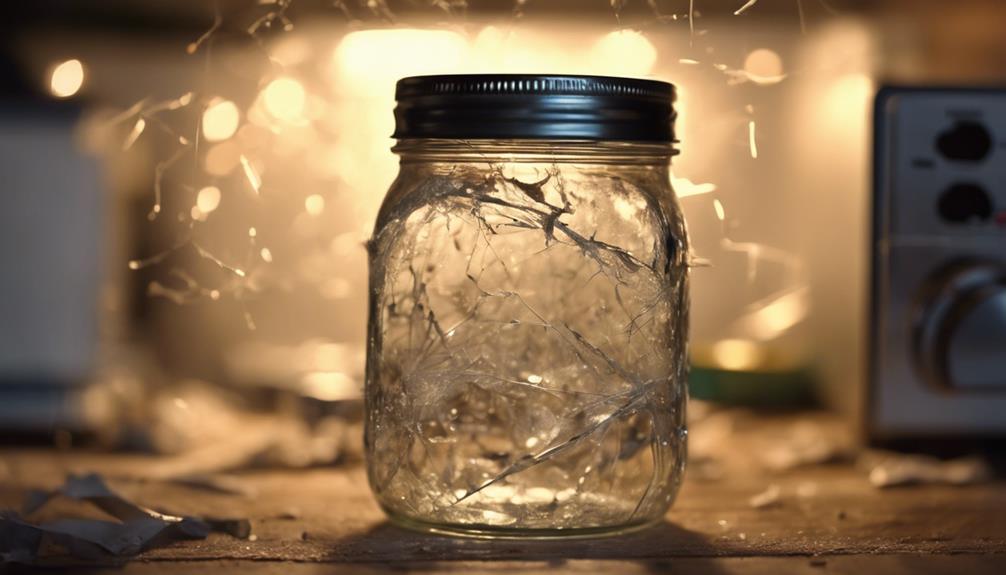
Glass mason jars pose a potential danger of explosion when subjected to rapid heat expansion, particularly in the microwave. The risk of exploding mason jars is heightened when exposed to hot water or extreme temperature variations. Factors such as imperfections in the glass or sudden changes in temperature can lead to catastrophic failures.
Mason jars are not designed to withstand the intense heat produced by microwaves, making them susceptible to shattering and causing potential harm. To prevent accidents and injuries, it is crucial to avoid microwaving mason jars, especially when they contain hot liquids or foods. Practicing caution and adhering to safety guidelines when handling glass containers in high-heat scenarios is essential to prevent the dangers associated with exploding mason jars.
Tips for Safe Usage
When considering the safe utilization of glass mason jars in microwave ovens, it is essential to prioritize the presence of a 'microwave safe' label on the container's base for reassurance.
Here are some tips for safe usage:
- Check for 'microwave safe' label: Ensure the mason jar is labeled as microwave safe before using it.
- Test thicker glass: If unsure, test thicker glass jars in the microwave for a minute or two to check compatibility.
- Avoid thin jars: Thin mason jars should not be tested in the microwave due to the risk of shattering.
- Don't cook without safety label: Avoid cooking or reheating food in mason jars without a safety label to prevent accidents.
- No metal rings: Never microwave the metal rings of mason jars as they can cause sparks or damage.
Impact on Food Quality
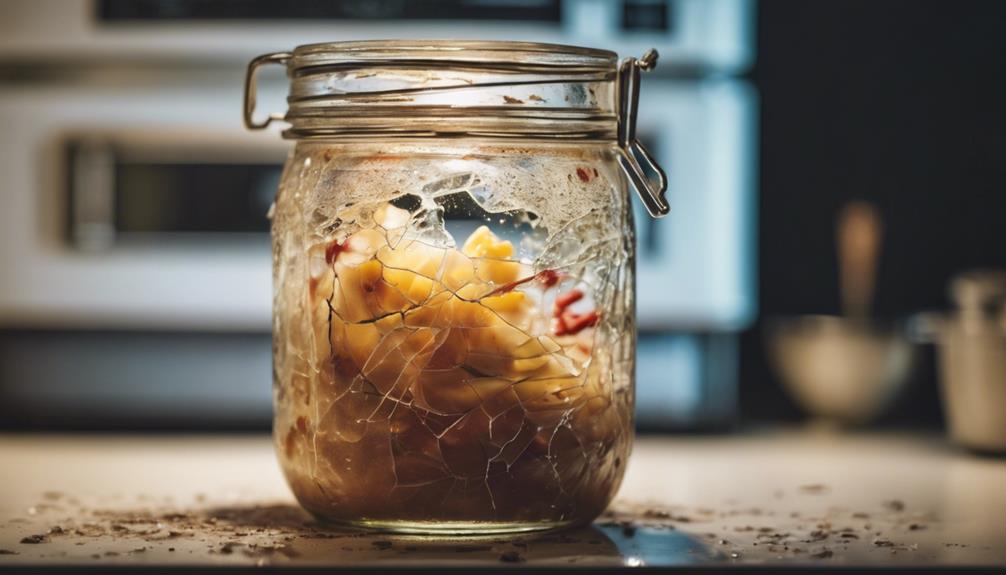
Heating food in a mason jar using a microwave can significantly alter the quality of the food due to the risk of uneven heating and potential glass breakage.
The intense heat transfer in a microwave can create hot spots in the food, leading to uneven cooking. This uneven heating can impact the taste and texture of the dish, potentially making it less appetizing.
Moreover, the thermal shock from the hot food and the cold glass can cause the glass jar to shatter, introducing glass fragments into the food. This can not only compromise the food's flavor but also pose a safety risk.
To maintain food quality and safety, it is advisable to keep mason jars away from direct heat sources like microwaves.
Final Considerations
In considering the implications of microwaving food in inappropriate containers, it is crucial to prioritize safety and opt for microwave-safe alternatives to prevent potential hazards. When it comes to using Mason jars in the microwave, safety should be the top priority to avoid accidents and injuries.
Here are some final considerations regarding Mason jars and microwave use:
- Mason jars are not recommended for microwave use due to the risk of shattering.
- Glass jars, including Mason jars, can become very hot when microwaved, posing a burn risk.
- Microwaving Mason jars without a microwave-safe label can lead to glass breakage and injury.
- To avoid accidents, opt for microwave-safe glass containers designed for heating food.
- Always prioritize safety and use appropriate containers for microwave heating to prevent hazards.
Frequently Asked Questions
Are All Types of Mason Jars Safe to Microwave, or Are There Specific Ones That Should Be Avoided?
When considering glass safety and heat resistance in microwave usage, it's essential to identify jars labeled 'microwave-safe' and avoid thin jars to prevent shattering. Adhering to microwave guidelines and avoiding metal rings ensures safe usage.
Can Mason Jars Be Used in a Conventional Oven or Only in a Microwave?
Mason jars are not suitable for baking in a conventional oven due to the risk of shattering. It is recommended to avoid using them in ovens. For microwave use, consider using microwave-safe glass containers as a safer alternative.
Can Mason Jars Be Reused for Microwaving Multiple Times, or Should They Be Replaced After Each Use?
When considering the reuse of Mason jars for microwaving, it's essential to inspect for wear and tear. Prioritize safety by replacing damaged jars promptly. Employ caution when handling hot containers to avoid burns. Dishwasher safety, proper cleaning, and storage practices are crucial.
Are There Any Specific Foods or Liquids That Should Not Be Microwaved in a Mason Jar?
Safety precautions and best practices for microwaving in mason jars include avoiding fatty or oily foods, carbonated beverages, high sugar content liquids, high salt content foods, and acidic foods to prevent glass breakage, pressure buildup, caramelization, glass corrosion, and weakening of the glass structure. Potential risks include overheating and glass shattering.
How Long Can a Mason Jar Be Microwaved for Before It Becomes Unsafe or at Risk of Breaking?
When microwaving a Mason jar, it is essential to exercise caution and limit the heating duration to a minute or two to prevent safety concerns. Prolonged exposure to heat can cause the glass to expand and potentially break, posing a risk.
Conclusion
In conclusion, while it is possible to microwave a Mason jar if it is labeled as microwave safe, caution must be exercised to prevent the risk of shattering or explosions. Without proper safety measures, microwaving a Mason jar can pose a hazard to both the glass jar and the individual using it. It is important to prioritize safety and follow guidelines to ensure a safe experience when using Mason jars in the microwave.
One anticipated objection to microwaving Mason jars may be the convenience factor, as it may seem easier to heat food in a glass jar. However, the potential risks and hazards outweigh the convenience, making it crucial to prioritize safety over convenience when considering microwaving Mason jars.

